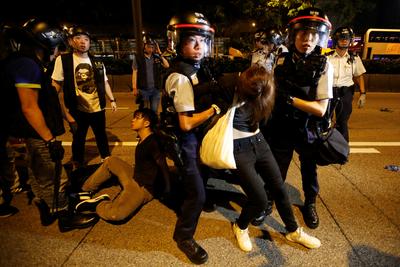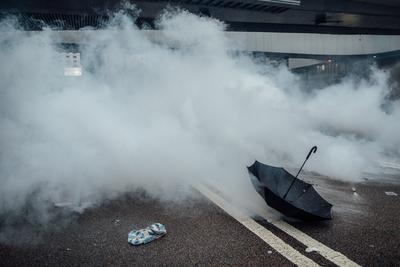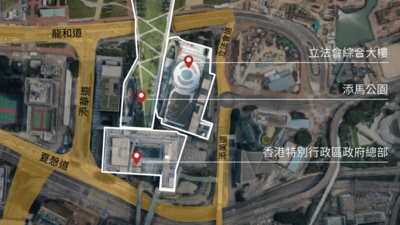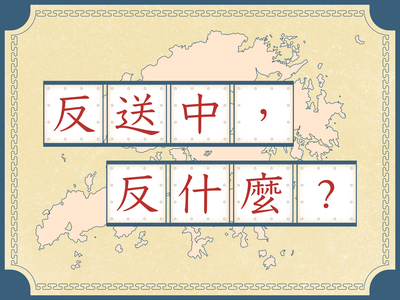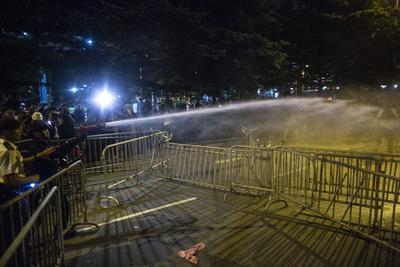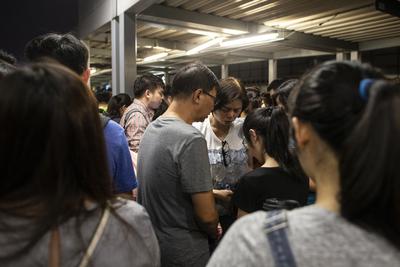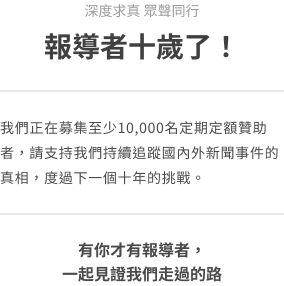Interview the Young Protestors in Anti-Extradition Campaign
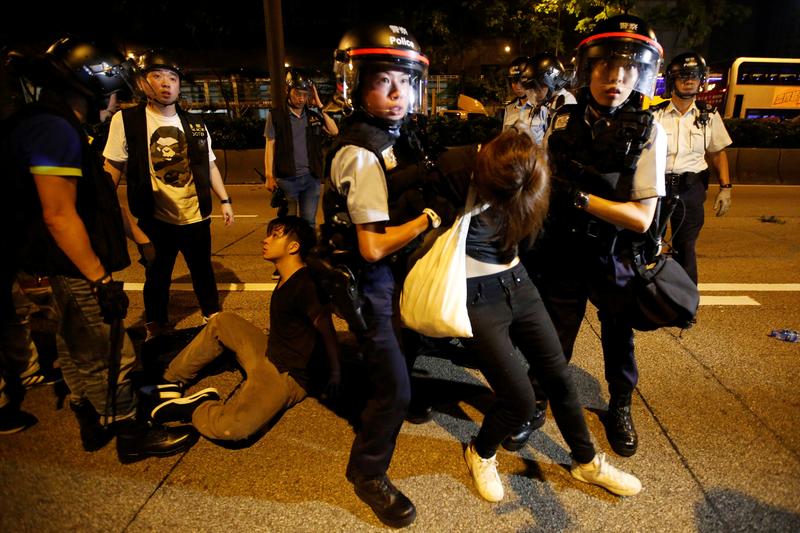
Among the 358 protestors encircled by police during Hong Kong's anti-extradition campaign on June 9, 80% of them were between the ages of 16 to 25.
In this protest, many ordinary youngsters confronted the police with their own lives - even risking imprisonment. When peaceful protest, rationality, non-violence, and massive gatherings did not shake the oppressive will of the government, the young protestors shouted, "Even if Hong Kong is dead, I'm going to die with it!"
What, exactly, caused their steely determination?
"Oppose extradition to China! Oppose extradition to China!"
In the early hours of June 10, a large group of young protestors occupied Wanchai's Gloucester Road in Hong Kong. Facing rows of riot police who were ready to take action, the youngsters raised their arms up high and chanted their slogan loud and clear behind their face masks.
Gloucester Road, one of Hong Kong's busiest main roads, consists of six lanes. At 2 am, when the traffic was light, young demonstrators in black shirts and face masks ran out from the side streets and stood on Gloucester Road. A few of them turned toward the oncoming traffic and spread their arms wide to stop the cars. Others rushed to put down iron barriers to blockade the road.
Both sides stayed still. Protestors in the front rows stared intensely at the police's movements while the protestors in the rear immediately sat down on the street. From Hong Kong's Legislative Council (LegCo) to the harbor front and Gloucester Road, they erected barricades while confronting the police's campaign of encirclement. The resistance activities left the protestors exhausted.
The police soon began rounding up the protestors again. In just a few pushes, the shielded riot police destroyed the road blockades, inching closer to the crowds. They tackled protestors who were singled out, pressed them to the ground, and waved their batons at the reporters who were trying to film the scene. Around 300 protestors failed to escape and were encircled on the sidewalk.
In the end, the Hong Kong police arrested 19 people, most of whom were around the age of 20. The 358 protestors in containment were searched and had their personal information marked down (as evidence for later prosecution). Within those protestors, over 80% were only between the ages of 16 and 25, 24 of whom were below the age of 18.
"The price (of resistance) is high. A lot of acquaintances around me have been arrested, charged, and jailed for more than several years," says Ah-Jeng (alias), 22, one of the 358 protestors encircled by the police. "But we will not step down because of this. I have mentally prepared to accept the cost."
"This generation of youth has accumulated too much helplessness. If we still feel helpless and the society keeps eroding no matter what we do, then we should risk everything. It's a fight against heavy odds, but someone has to do it."
"When the police released tear gas on September 28 (2014), I saw them raising the flag that said 'evacuate immediately or we will open fire,' and a riot police pointed his long-barrel rifle at my head," says Ah-Jeng, who was only Form 5 (the equivalent of secondary school year 5) at the time and actively participated in the Umbrella Movement and many other protests.
During the 2016 Mong Kok civil unrest, his head was covered in blood after being violently beaten with a policy baton.
In 2014, the Umbrella Movement arose from the citizens' fighting for the right to vote. They occupied Admiralty, Mong Kok, and Causeway Bay (three of the busiest districts in Hong Kong) and held the grounds for 79 days. But they failed to convince the Hong Kong government and Beijing to concede. The unsuccessful Umbrella Movement left them with a sense of failure, leading to a dissipation of social movements.
Towards the end of the Umbrella Movement, some protestors were reluctant to the idea of "Peace, Rationality, Non-Violence, Non-Profanity (PRNN)," which failed to force the authorities to respond. Instead, they acted more radically. In the face of the police shields and batons, the protestors started fighting back, even throwing objects at them: water bottles at first, then bricks.
When questioned about their way of resistance, the militant protestors often ask, "The pro-democracy camp has used PRNN for 30 years. What have they gained?"
The violence level of the militant resistors peaked at the 2016 Mong Kok civil unrest.
During the midnight of 2016's Lunar New Year's Eve, young demonstrators clashed with the police as they were trying to protect the street food hawkers from being cleared by the law enforcement. Clashes turned into a night of riot as protestors set garbage on fire in multiple spots, threw bricks at the police, and fought them in close quarters.
The blaze on the streets of Mong Kok shocked the entirety of Hong Kong, a society that has rarely seen social upheaval in the past years.
The Hong Kong government was not lenient in pursuing legal action against the protestors. Authorities convicted 40 protestors on the basis of "rioting,"(暴動罪) a criminal offense that was established during the British colonial period. The definition of rioting was broad – even if the defendants did not throw any brick or set anything on fire, they were subjected to extreme criminal sentences.
One of the arrested was Edward Leung Tin-kei(梁天琦), the former spokesperson of Hong Kong Indigenous, a localist political group that called for a militant approach against government oppression. Leung was convicted with rioting because he "threw plastic barrels at a police officer, attacking him with feet and a wooden board" among other reasons. He was sentenced to 6 years in jail.
Another defendant in the same case Lo Kin-Man(盧建民) was sentenced to seven years in prison because of "throwing objects at the police defense line and picking up mud from the ground to attack the police force."
Ray Wong Toi-yeung(黃台仰), another former Hong Kong Indigenous spokesperson, went into exile with a party member Alan Li Tung-sing(李東昇). In May 2019, they were granted asylum in Germany and became political refugees. Also convicted with rioting, 18-year-old Lee Sin Yi(李倩怡) fled to Taiwan, now missing. Other defendants in the same case were convicted with an average sentencing of three years and above.
Before the Mong Kok civil unrest, the Hong Kong government usually pressed lighter criminal charges like "illegal assembly" or "assault on police officer" with sentencing to jail for only several months. Since the Mong Kok case, however, "militant resistance" is exposed to a much higher risk of criminal charges. Rioting charges and five-to-seven-year sentences linger in the minds of all activists. Even the leader of Occupy Central, who was pro-peace, was sentenced to over a year in prison. This has left Hong Kong civil society with a sense of helplessness when it comes to resistance and change.
The dormant social movements in Hong Kong have recently resurfaced due to the government's forceful push in revising the extradition law.
Right after the screening of Avengers: Endgame, Hongkongers often describe the current situation as the "Endgame." In the five years since the Umbrella Movement, Hong Kong has experienced police clampdown, legislators being disqualified or stripped of their seats, the loss of academic freedom, and heavy criminal sentences against protestors, etc. The extradition law, if passed, means that the legal barriers separating Hong Kong from China will be formally rebuked.
The freedom that is left will no longer be protected. Any political movement will have the risk of being extradited to China for unfair trials. "One Country, Two Systems"(一國兩制) will officially crumble.
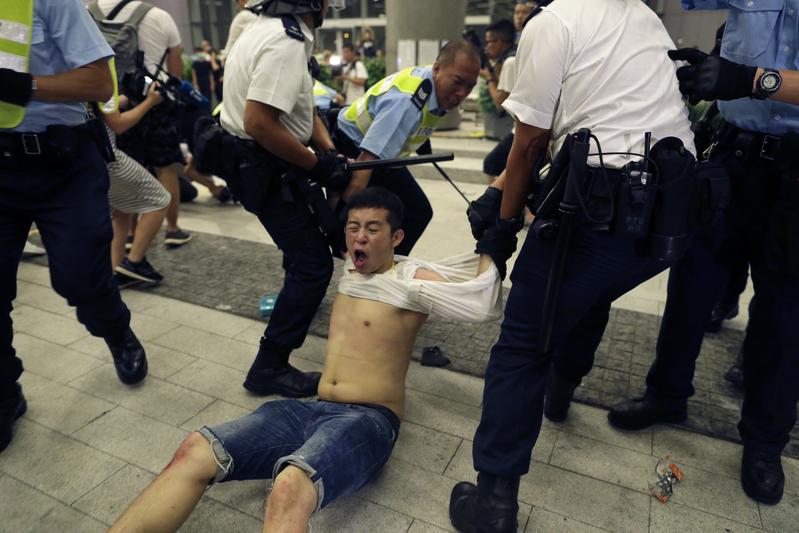
On June 9, a massive crowd took to the streets to protest against the extradition law. The organizers claimed 1.03 million have joined the protest. Soon after the protest, however, the government announced that it will not shelve the law revision, and that it will continue the second reading as scheduled.
A large crowd of protestors stayed near the LegCo and clashed with the police around midnight.
"1.03 million protestors can inspire children born after the 2000s, who didn't know anything about politics. I still remember when I was three or four years old, I thought it was amazing to have 50,000 protestors on the street for 2003's First July march," Ah-Jeng says. "But if everyone just leaves after the fact and the government doesn't change its stance, what difference does it make to be on a headline? The situation has not improved at all… The Civil Human Rights Front even says to surround the LegCo to demand conversations - Motherfucker! What's there to talk about with this regime?"
In the protest zone outside of the legislature, protestors in face masks attempted to rush toward LegCo's doors. Police dispersed the crowd with batons and pepper spray. In return, protestors threw objects and pushed the barricades against the police. Riot police dashed forward and tackled the protestors to the ground, some were dragged along by their hair.
Water bottles, iron bars, and pepper spray were flung around in chaos. But the protestors did not retreat; rather, they moved to another base and occupied Lung Woh Road across from the legislature.
These protestors had no obvious leader, but only relied on problem-solving instincts and exchanging information through online forums and instant messaging. They maintained order among chaos and aimed for the goal: to fight a guerrilla war with the police force and try to occupy roads without persisting in clashes; the priority was to avoid getting arrested.
University student Siu-sin (alias), 18, was one of the midnight movement participants. She escaped the encirclement while she was heading back for supplies. Joining this kind of movement, she says, is a gamble – if the crowd is big enough, her chance of getting arrested becomes smaller. "It's pushing for one's luck," Siu-sin says.
Different university students have discussed whether someone could be a "microphoner," a person who speaks to the crowd with a loudspeaker and leads the people to action, according to Siu-sin. But no one was willing to shoulder the role due to the risk of heavy prison sentences. The militant protestors lost the opportunity to occupy the major Harcourt Road (the original site of the 2014 Umbrella Movement) mainly because there was no leader, she says.
"But I won't blame anyone… I don't even dare to lead the dash forward."
Siu-sin says she can tolerate tear gas, being beaten or injured, but she is still wary of a prison sentence that could last up to years. "My family has raised me for so long. If I have to sit in jail for some years, I would feel very sorry to them. I try to avoid thinking about what if I get arrested, what if I have to go to court - I can only convince myself that it probably wouldn't happen. I can't face the consequences… But emotionally, I still want to persist."
Ah-jeng, who claims to have experienced a lot, eventually had his information jotted down by the police. He faces the possibility of being arrested at any time, but still appears calm. He always remembers that a senior in his university who was convicted for resistance had confessed his fear the night before his sentencing, but still thought he couldn't step back. He had said to Ah-Jeng, "You have to take responsibility for what you did. You can't have the mentality that you can always get out safely."
Ah-Jeng has kept those words in mind. To the younger students who were ready to put on their face masks and rush to the frontline, Ah-Jeng warned them to consider whether they could bear the consequences. He successfully persuaded five to six new students to leave, but he himself wasn't able to evacuate in time.
The most unforgettable thing for Ah-jeng was the facial expressions of the encircled protestors. He says, "I expected a bunch of militant protestors ready to sacrifice. We weren't political celebrities anyway – we were just a bunch of minion soldiers without halos." As Ah-jeng recalls, he looked around and only saw a bunch of "fresh faces" obviously without any experience, "they were very worried and just kept checking on their phones about what would happen after getting arrested."
"All of them looked worried, but they had very pure faces… I'm 22 years old and I was already the older one among them."
"Why is it always the young people like these ones who are willing to risk their own future to fight the government with death?"
Among the big groups of youngsters on Gloucester Road, the over-30-years-old Ah-San (alias) stood out as an oddity. Although he disagreed with violent resistance, he did not leave the protest site early.
"At the LegCo, I heard some young people saying, 'We finally have the chance!'" Ah-San recalls his impression of the youth. "They feel hopeful, and they think the moment they walk out, they'll be able to achieve something."
"Everyone shares responsibility (over Hong Kong)… How would you let a bunch of teenagers face it alone?"
Though he does not agree with violence, Ah-San pays little attention to criticism. "I don't want to criticize the young people for being rash," he says. "Ask yourself honestly, do other Hongkongers really know what to do? No one knows what to do under this regime."
Wanting to support the protestors as much as he could, Ah-San decided to stay at the site despite knowing that he could not do much to help. At last, he could only accompany the younger people surrounded by the police on the sidewalk of Gloucester Road. After a few hours, he was finally released. A police officer took down Ah-San's information and added, "You're out playing so late, satisfied now?"
To this officer, this group of youngsters who gambled their future to occupy the streets and confronted the riot police were merely "not having enough fun."
After the night, Ah-San returned home to his parents who are government supporters. They immediately reprimanded him as a rioter. "I packed my things right away and went back to my dorm," he says. "If they don't apologize, I won't go back."
The 22-year-old Ah-Jeng will soon graduate. He loves researching at his department and plans to get his PhD and become a university professor. Aware of the universities' negative attitude towards dissident faculty in recent years, having once stuck his head out for a cause will do no favors for realizing his goals.
But Ah-Jeng emphasized that he will not leave Hong Kong.
"It's been 20 years since Hong Kong was returned to China. Hongkongers have face relentless government suppression, our liberties compromised. Students and intellectuals who wanted to resist were exterminated - the government is clearly forcing a citizen revolution. Others have said they want to emigrate - but we are not in the wrong, why should we be the ones to leave?"
"For the years since the handover of Hong Kong, our cultures are destroyed, and common values disappeared; it's utterly disappointing. But as long as Hong Kong has yet to become another average city in mainland China, we will fight for it until the last moment."
"No matter what, I won't emigrate. Even if Hong Kong is Dead, I'm Going to Die with it."
A reporter asked Siu-sin, who just turned 18 this year, what kind of future she would imagine having if none of this has happened. Her answer was surprisingly simple, "I want to live in a free and democratic society. I'll live a simple life and provide for my family, sometimes going on vacations. I'd be very fortunate to have this kind of life."
At the outbreak of the Umbrella Movement, Siu-sin was only 13. She stayed in Admiralty because she wanted to support the university students at the time. That year, the university sphere was full of thunder and spark; thousands went on strikes. But now, when she has become a university student herself, many schools cannot even form a student union with a full cabinet.
The students around Siu-sin are living the simple life in her ideal: not asking about politics, "not caring about anything." It then dawned on her that she's a minority among her peers. Some days ago, when she was handing out anti-extradition flyers near the Hong Kong-China border, she saw the grade school students in the district chatting in Mandarin and felt shocked about how the city in her memory is disappearing much faster than expected.
"A million people went on the street and nothing happened in the end. The government had already said they weren't going to listen to us around 11pm on the same night. Everyone moved on to go to school and work the next day… When I see such a hopeless society, one that's already not the Hong Kong I'm familiar with, I just want to take a stab, a gamble… It's actually not a logical decision," she says.
The government insisted on moving forward with the second reading of the extradition law on June 12. More actions could erupt at any moment. Both Siu-sin and Ah-jeng said they would participate should there be another protest. "Realistically speaking, it's impossible. But no matter what, I should lie a little to myself. A one-to-two percent chance is a chance," Siu-sin says.
What the youth wants to ask is: will we see a democratic, free Hong Kong in our lifetime?
(To read the Chinese version of this article, please click: 18歲就迎來「我城終局之戰」,香港少年少女的絕望與希望.)
深度求真 眾聲同行
獨立的精神,是自由思想的條件。獨立的媒體,才能守護公共領域,讓自由的討論和真相浮現。
在艱困的媒體環境,《報導者》堅持以非營利組織的模式投入公共領域的調查與深度報導。我們透過讀者的贊助支持來營運,不仰賴商業廣告置入,在獨立自主的前提下,穿梭在各項重要公共議題中。
今年是《報導者》成立十週年,請支持我們持續追蹤國內外新聞事件的真相,度過下一個十年的挑戰。

